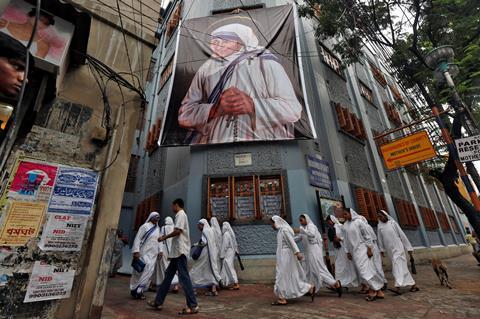India is cracking down on Christian charities just when they are needed most.
- Thanks to international pressure, the Indian government has finally
- renewed the licence of Mother Teresa’s Missionaries
- of Charity. But there are thousands more Christian organisations still in limbo.
- In the aftermath of Covid-19, we need them more than ever, says Archbishop Joseph D’Souza

If you could apply for sainthood at the Catholic Church, you would be hard-pressed
to find a more impressive resume than Mother Teresa’s. Teresa, who died in 1997,
spent decades caring for the poor, sick and destitute in India’s slums. She founded
Missionaries of Charity, a Catholic institution that now cares for the homeless and
poor in dozens of countries. She received countless humanitarian awards, among
them the Nobel Peace Prize. Many considered her a real-life saint and, in 2016, Pope Francis
officially recognised her as one. Yet none of this seemed to matter to Indian
authorities when Missionaries of Charity tried to renew their permit to operate
as a nonprofit (which it has held since 1950) last December.
FUNDING BLOWS
To those who have been keeping an eye on the state of the nonprofit sector in
India, and the treatment of Christians there, it came as no surprise. In 2020, the
government amended the Foreign Contribution Regulation Act (FCRA), a law
that regulates money that nonprofits receive from overseas. Nonprofits have
long complied with the FCRA, but the new changes have seriously compromised
their ability to continue operating.
For example, nonprofits can no longer receive funds from each other, even if
they are both licensed under the FCRA. This is a blow to smaller organisations
who do not have the capacity to fundraise internationally. It is not uncommon for
larger nonprofits to partner with other smaller ones; in many cases, doing so is more effective since local organisations understand the issues affecting their communities and are
more successful at solving them.
IF YOU COULD APPLY FOR SAINTHOOD, YOU WOULD BE HARD-PRESSED TO FIND A MORE IMPRESSIVE RESUME THAN MOTHER TERESA’S
Another challenge nonprofits face is the requirement to keep administrative
expenses at or below 20 per cent of their income. Many charities, especially those
who provide immediate relief to people in need, aim to lower their operating
expenses to make the most of the money they receive. But there are other
organisations, such as those dedicated to research and education, that
(understandably) have larger staff budgets. This new rule risks hampering
important research.
Finally, the process for renewing nonprofit licences is plagued with problems.
The forms are onerous and confusing. All organisations must open accounts at a
state-owned bank in New Delhi. Even nonprofits with experienced, skilled staff
were unable to finish the process because of technical and bureaucratic problems.
A STRANGE IRONY
There is a strange irony at play in this whole situation. Prime Minister Indira
Gandhi originally instituted the FCRA in the wake of a violent insurgency by a
separatist faction receiving support from the Sikh diaspora. It was designed to
prevent overseas financial contributions to groups posing a threat to India’s national security. Yet, over the years, changes to the FCRA have resulted in the exact opposite.
In 2014, New Delhi’s high court found several politicians guilty of violating the
FCRA. To shield themselves from retribution, they surreptitiously made changes
to the FCRA, through amendments in the annual budget, so that it would not
apply to them retroactively. They also redefined ”foreign political entities”,
enabling Indian companies linked to overseas corporations to donate to political
parties through “electoral bonds.”
A STRONGER FUTURE
Prime Minister Narendra Modi wants India to become self-sufficient, an ideal many
Indians such as myself support. It will require sustained investment in areas such
as education, health care, economic development and agriculture, but India has a
rich pool of talent and resources waiting to be tapped into. Nonprofits can help
achieve this goal, too, particularly as we reckon with the lingering damage of
Covid-19.
Thankfully, the government has relented and renewed the Missionaries of Charity’s
licence (no doubt in part thanks to international pressure). But over 5,700
nonprofits remain in limbo. India needs them if we are to emerge from this crisis
stronger. PC.

.jpeg)